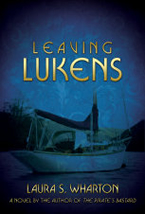September 28, 2011
Leaving Lukens
Laura Wharton
Broad Creek Press (2011)
ISBN 9780983714804
Bittersweet Love Story about Leaving Home and Letting Go
 In her newest novel, Laura Wharton, author of “The Pirate’s Bastard,” returns to the coast of her beloved North Carolina, but this time, instead of buccaneers and pirates, she brings us the simple story of a young girl about to lose her island home (oh, and it’s World War II so Wharton throws in some Nazis besides). “Leaving Lukens” could be called a World War II novel or a romance, and both designations would be correct, but to me what made this novel charming is its regional and small town feeling.
In her newest novel, Laura Wharton, author of “The Pirate’s Bastard,” returns to the coast of her beloved North Carolina, but this time, instead of buccaneers and pirates, she brings us the simple story of a young girl about to lose her island home (oh, and it’s World War II so Wharton throws in some Nazis besides). “Leaving Lukens” could be called a World War II novel or a romance, and both designations would be correct, but to me what made this novel charming is its regional and small town feeling.
The novel’s plot is fairly simple. Ella is a seventeen year old girl who lives in Lukens, an island community whose school will no longer have a teacher. The community has been slowly declining and the lack of a teacher means the majority of the residents will be leaving the town, including moving their homes. Ella is full of mixed emotions about leaving the only community she has ever known, but at seventeen, she has no choice but to move with her mother and future stepfather to the mainland. She has some hope of being rescued by her boyfriend Jarrett, but he is about to leave for the war, and he also has a drinking problem—no real rescue there. Then a frightening encounter leads Ella to a chance meeting with Griff, the visiting nephew of a Lukens’ resident. Griff is an adventurer who soon has Ella diving with him for treasure. Despite the sailing adventures and clam bakes, sinister events are approaching, and Griff may have more secrets than he’s willing to reveal at first. Will things work out between Griff and Ella? Will Ella really have to leave Lukens? Will World War II destroy the world the lovers know?
Wharton is excellent at describing her characters and in creating a historical atmosphere. She has clearly researched the time period, the music, the details of the Navy and other military affairs during World War II, and the history of Lukens itself. She writes with a grace and smoothness, and despite her book having a Nazi subplot, she does not rely on sensationalism or extreme plot twists to gain her readers’ attention. She creates nostalgia and wistfulness in her writing without falling into sentimentality, and in the end, the reader fully understands all the reasons why Ella, the main character, does not want to leave Lukens, along with the reasons she finds for wanting to start over. Far more than a story about the war, “Leaving Lukens” is about finding happiness, and finding that home is in the heart and not a physical place.
As an author myself of historical fiction and life in small towns, I understand the wonderful drama and the possibilities in writing about a real community and depicting its apparent smallness, as well as the multitude of drama, story, and relationships that result precisely because of its location. E.M. Forster once said, “Expansion. That is the idea the novelist must cling to. Not completion. Not rounding off but opening out.” Wharton opens up her novel. The story may be simple, but as we read, we get a sense that Lukens is a special place, that it has a long and proud if simple history; that it’s people have known one another for generations and have relationships, stories, secrets, joys and trials they have shared, making them “our people” as Ella refers to those who lie buried in the Lukens cemetery.
And because Wharton makes Lukens so real—makes us realize that on the novel’s peripheries is so much richness she only hints at—so many stories we do not know—the reader is made to feel nostalgic, sad, almost cheated that Lukens as a community is coming to an end—cheated, but completely pulled in to understand Ella’s feelings about leaving home. This kind of story is my favorite kind, the kind that is firmly built upon a sense of place and the deep relationships of its characters—it is the kind of novel E.M. Forster, Anthony Trollope, and Margaret Mitchell would have loved. It creates that expansion, and it leaves us wondering what more of Lukens we might have known and appreciated if it had been able to survive. It makes me wish, not for a sequel, but a prequel, so I might travel back and experience Lukens in earlier generations to see how it became so special. “Leaving Lukens” is an escape into the past that leaves behind a bittersweet yearning to travel back into time even farther.
For more information about “Leaving Lukens” and Laura Wharton, visit www.LauraWhartonBooks.com.
— Tyler R. Tichelaar, Ph.D. and author of the award-winning “Narrow Lives”

